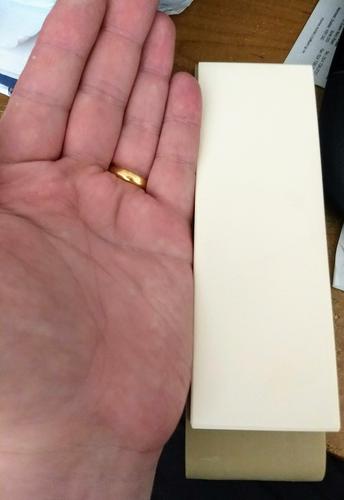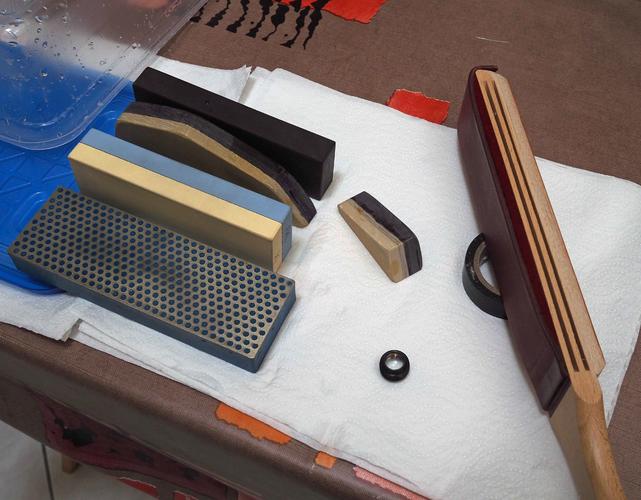Results 1 to 8 of 8
 7Likes
7Likes
Thread: Suehiro 1000/3000 SKG-27
-
06-14-2018, 01:03 PM #1Senior Member

- Join Date
- Mar 2017
- Location
- Calgary, Alberta, Canada
- Posts
- 321
Thanked: 41 Suehiro 1000/3000 SKG-27
Suehiro 1000/3000 SKG-27
Coming to me straight from Japan, the Suehiro SKG-27. This will keep my knives sharp and do the bevel-setting job on my razors. I have plenty of lapping grit to keep it flat too

 https://mobro.co/13656370
https://mobro.co/13656370
-
06-14-2018, 01:35 PM #2

That's what I use. A great combo. 40mm x 130mm so it's good for hand-holding. There are some larger versions too.
Striving to be brief, I become obscure. --Horace
-
06-15-2018, 12:33 PM #3Senior Member

- Join Date
- Mar 2017
- Location
- Calgary, Alberta, Canada
- Posts
- 321
Thanked: 41
-
06-15-2018, 01:09 PM #4

Maybe, I was going by the picture, not the number. But be careful about stated package dimensions rather than actual hone dimensions. The pictured hone is 40mm x 130mm and has the dedicated base as shown. The larger one I was referring to is something like 63mm x 180mm. I don't need that much length so I cut it down to 140mm. There are other formats as well.
Last edited by Brontosaurus; 06-15-2018 at 02:58 PM.
Striving to be brief, I become obscure. --Horace
-
07-04-2018, 01:38 AM #5Senior Member

- Join Date
- Mar 2017
- Location
- Calgary, Alberta, Canada
- Posts
- 321
Thanked: 41
I finally got it today. I understand why some would consider it for hand-held usage.
 https://mobro.co/13656370
https://mobro.co/13656370
-
07-09-2018, 03:23 AM #6

Thanks for the follow-up. In spite of its relatively small size by contemporary North American straight-razor honing standards, it's a great combo hone, followed by a similarly-sized coticule and slate finishing stone. Start with the heel and move up and down, shifting the blade gradually in sections until ending with the toe. Do somewhat the same with the similarly-sized coticule, using circles or ellipses, before ending with uninterrupted X-strokes to even out the preceding overlapped wear. Then finish with laterally-biassed X-stroke passes on the slate finisher. Such a sequence has yet to fail me. The only draw-back is that the synth needs a few days to dry out after being soaked in water.
Attached is a photo of the sequence in question from my end. 6" x 2" coarse DMT for lapping as needed, and the slurry stone only being used to clear swarf as accumulated on the coticule.

Last edited by Brontosaurus; 07-09-2018 at 06:12 AM.
Striving to be brief, I become obscure. --Horace
-
The Following User Says Thank You to Brontosaurus For This Useful Post:
dinnermint (07-09-2018)
-
07-09-2018, 09:04 PM #7Senior Member

- Join Date
- Mar 2017
- Location
- Calgary, Alberta, Canada
- Posts
- 321
Thanked: 41
Thanks for the advice. I didn't think of using different types of strokes on different stones.
My sequence is going to be the Suehiro, followed by a barber hone and then a CNAT. Odds are that it won't perform as well as yours. For big work, I have a Tyrolit 120/400, but I don't expect to need that for razors.https://mobro.co/13656370
-
07-09-2018, 09:17 PM #8

One thing about the 3k side: it leaves a very nice polish/scratch pattern, seeming higher than 3k to some (I'm not really all that well-versed on scratch-pattern analysis). Depending on how your Cnat performs, you might skip the barber's hone and move straight to the Cnat. Try it with water, and if that's not enough, with a light slurry. Both I and a honer on another forum have had good results using a Welsh dragon's tongue off the 3k, the DT being a very cheap stone. Could be a bridge to the Cnat, and most certainly would be a bridge to a Welsh purple slate.
Edit: Also, this synth combo is really good about releasing swarf as built up on the surface. When it accumulates, just gently rub the tip of your forefinger over it and it should lift off a number times before actually needing to be lapped to do this.Last edited by Brontosaurus; 07-09-2018 at 09:25 PM.
Striving to be brief, I become obscure. --Horace



 LinkBack URL
LinkBack URL About LinkBacks
About LinkBacks






 Reply With Quote
Reply With Quote
